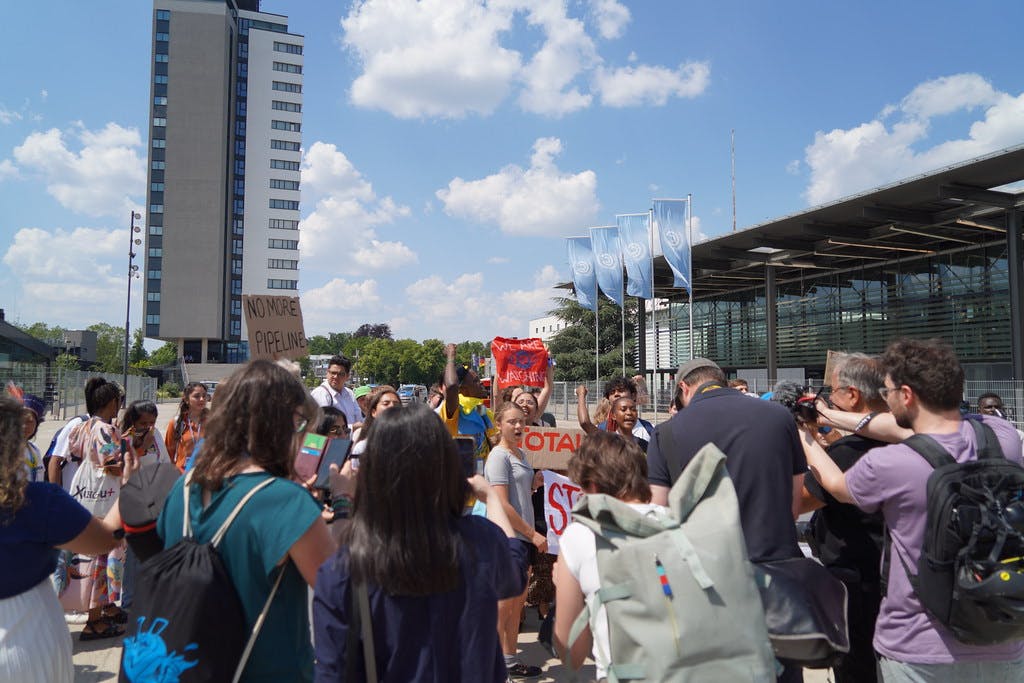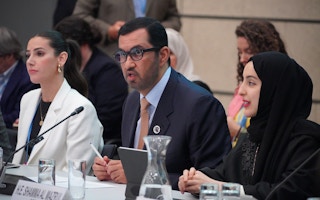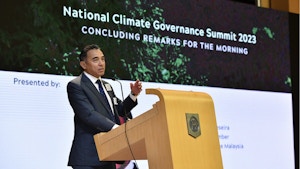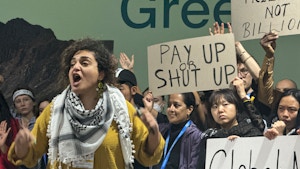The United Arab Emirates (UAE) COP28 presidency has not been able to set expectations and prepare for the climate action that governments must agree on ahead of the summit in Dubai later this year, said observers at the close of the intersessional talks in Bonn, Germany.
To continue reading, subscribe to Eco‑Business.
There's something for everyone. We offer a range of subscription plans.
- Access our stories and receive our Insights Weekly newsletter with the free EB Member plan.
- Unlock unlimited access to our content and archive with EB Circle.
- Publish your content with EB Premium.
“We’re calling on the presidency to please step in, share a vision, share some objectives, try to build some of these bridges between countries to identify landing zones and possible compromises on the big crunch issues like loss and damage and the mitigation work programme,” said Alden Meyer, senior associate at London-based think tank E3G, at a media briefing at the close of the two-week intersessional meetings on Thursday. “It’s time to shift out of listening mode into action mode.”
UAE designated COP28 president Dr Sultan al-Jaber, also the head of the state-owned oil company ADNOC, said in a statement on the first week of the Bonn meetings that a phase down of fossil fuels is “inevitable”, stronger language than he has used before.
He also spent the first week of the talks participating in sessions on what the youth had to say about the global stocktake, or the process of measuring the world’s progress towards achieving the Paris Agreement climate goals. Despite these, al-Jaber will still need to deliver a “clearer vision and political pathway that attracts leaders’ attention to deliver a satisfactory outcome in Dubai”, said Meyer.
It is not yet too late for al-Jaber to offer more information on what he wants to get out of the COP, said Meyer, as he still has several meetings with world leaders in the run-up to the Dubai conference, including the climate ambition summit with United Nations (UN) secretary-general António Guterres in September and the pre-COP ministerial meetings hosted by the UAE in late October, among others.
“
We’re calling on the presidency to please step in, share a vision, share some objectives, try to build some of these bridges between countries to identify landing zones and possible compromises on the big crunch issues like loss and damage …
Alden Meyer, senior associate, E3G
Even if al-Jaber is able to present a more ambitious plan to address the worsening climate crisis ahead of the summit in late November, his words will be meaningless if they are not accompanied by concrete action, said John Leo Algo, deputy executive director for programmes and campaigns, Living Laudato Si Philippines, an environmental advocacy group affiliated with the Catholic Church.
“We have heard these promises from COP presidents before al-Jaber, and the odds are we’ll hear them in succeeding negotiations. What we have not seen actually done is for these bold words to be accompanied by concrete commitments and actions,” said Algo.
The COP26 presidency in Glasgow came up with the first UN treaty to acknowledge the need to do something about the main source of greenhouse gas emissions, when it called on countries to “[accelerate] efforts towards the phasedown of unabated coal power and phase-out of inefficient fossil fuel subsidies”.
At COP27, the Egyptian leadership was able to reiterate the COP26 decision but failed to broaden it to encompass oil and gas.
A growing divide between rich and poor

Swedish climate activist Greta Thunberg joins a protest during the pre-COP meetings on 12 June in Bonn, Germany, calling on banks to stop funding new fossil projects in the same city. Image: UNclimatechange, CC BY-SA 3.0, via Flickr
The mid-sessions in Bonn failed to patch up differences between wealthy nations who wanted to focus on emissions reductions work and developing nations who wanted to address the lack of international finance to help them adopt clean energy.
“What we saw in Bonn is a growing division between the developed and developing world—a divide so severe that they could not even agree on an agenda until the day before the end of the two-week summit,” said Algo, who sat at the sidelines of the negotiations.
“We should not forget that developed nations promised to provide developing countries the funding and support they need, as stated under the Paris Agreement. Instead, they are finding new ways to avoid living up to their responsibility and sufficiently reduce their emissions.”
“
What we saw in Bonn is a growing division between the developed and developing world—a divide so severe that they could not even agree on an agenda until the day before the end of the two-week summit.
John Leo Algo, deputy executive director for programmes and campaigns, Living Laudato Si Philippines
Last year’s climate summit concluded with delegates agreeing to establish a loss and damage fund to help countries most affected by rising temperatures to be able to manage climate disasters.
The details on how it will operate and where the money will come from have been worked on by a committee ahead of the climate summit in Dubai.
Since 2020, developing countries have been waiting for US$100 billion a year in finance to help them shift to clean energy and adapt to global warming—a pledge rich nations have said they would finally meet by this year.
Rich countries have fallen significantly short and only provided US$83 billion in 2020, two thirds of it for mitigation and more than 70 per cent of the public finance provided as loans.
This delay and mode of funding have led to a lack of trust that is needed for effective political negotiations, noted Algo.














